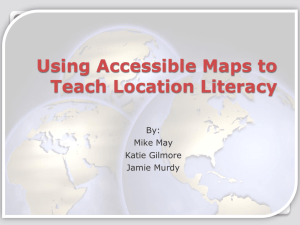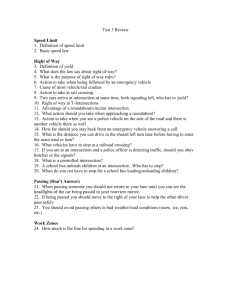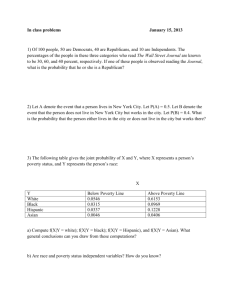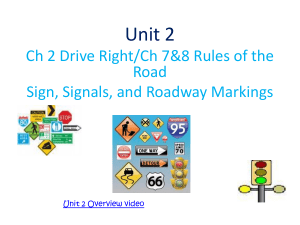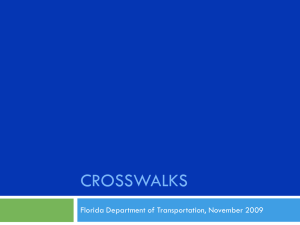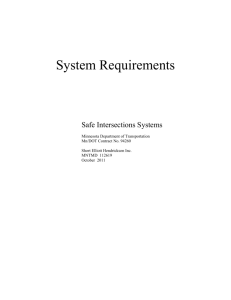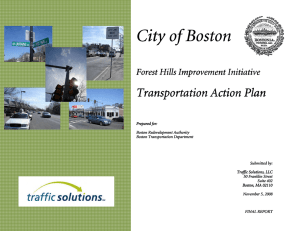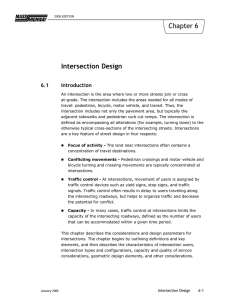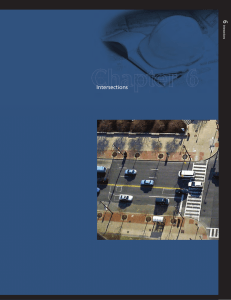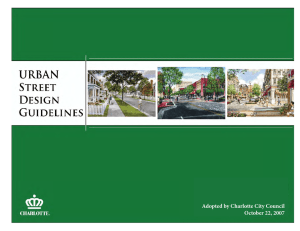Chapter 2 DE PP - Summit Public Schools
advertisement
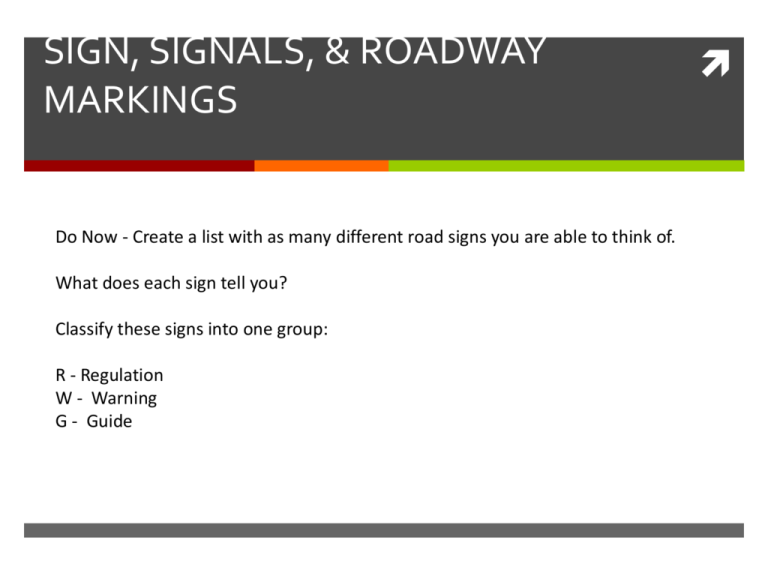
SIGN, SIGNALS, & ROADWAY MARKINGS Do Now - Create a list with as many different road signs you are able to think of. What does each sign tell you? Classify these signs into one group: R - Regulation W - Warning G - Guide Traffic Signs Meaning by Shape Meaning by Color STOP & Yield SIGN Regulatory ALWAYS come to a COMPLETE stop Stop sign or stop lines indicate where to make a legal stop. ( If your view is blocked approaching an intersection, move ahead slowly and prepare to stop again. Yield Signs Check in front and behind of you. SLOW DOWN!! Be prepared to stop. Proceed only when safe without affecting the flow of traffic. You must also yield the right of way to: Pedestrians Other vehicles in or approaching the intersection 4 – WAY STOP Four Way Stop At some intersections stop signs might be posted in all four corners Follow these steps when approaching: 1. The driver who stopped first should be allowed to go first 2. When vehicles stop to the right or left of each other at the same time, the driver on the left should yield to the driver on the right. 3. When stopped across the intersection facing oncoming traffic, the driver going straight should proceed, the driver turning left should wait. 4. Show your intention to proceed by moving forward slowly before entering the intersection 5. Check for traffic ahead and to the sides before entering intersection Four Way Stop WHAT WOULD YOU DO? SAFE SPEED It is a rainy night and it is difficult to see the road. Your friend is driving at the posted speed limit, but you think it would be safer to go slower. Suggest two things you could say to persuade your friend to slow down. Speed Limits They are designed to manage traffic flow at safe speeds. Speed Limits are set for ideal driving conditions. BASIC SPEED LAW Law states that you may not driving faster than is safe for existing conditions, regardless of posted speed limit. Advisory speed limit – Sharp curves, Warning signs Minimum speed limit - Expressways Regulatory Signs In addition to YIELD, STOP, and Speed Limit Signs, other regulatory signs are used to direct traffic and to control parking and passing. WARNING SIGNS Help you avoid surprise situations on the road Most warning signs are diamond-shaped and have black symbols or lettering on a yellow back round Pedestrian or School-Zone Signs Railroad Advance Warning Sign Pedestrian or School-Zone Signs Pedestrian or School-Zone • A school zone is a portion of the street or highway that is near a school and subject to special speed limits. – A school zone sign only shows two children and it is posted within a block of the school – A school crossing sign shows children in a crosswalk area *Be extra alert in a school zone. Children might dart out into the street without looking. They might ride bicycles on the wrong side of the road or take unexpected actions. Railroad Advance Warning Signs Slow down as you approach train tracks and be prepared to stop. The crossing signs may have a number of tracks posted on it. Flashing red lights or crossing gates might be assed to alert you when the train in coming. Construction Signs An orange sign in a diamond or rectangular shape These signs alert you to construction zones Be ready to slow, stop, or drive around workers and equipment Follow the directions from signs and workers directing traffic In N.J., fines are DOUBLED in construction zones Guide Signs Guide signs provides a variety of information such as marking routes, intersections, service areas, and other points of interest. Route Signs – local, state, and interstate routes are posted with route signs. State and County route markers will vary from state to state. Interstate route – are red, white, and blue, with a special numbering system. Guide Signs Other Guide Signs BLUE – highlights highway services such as fuel, food, lodging, and nearby hospitals. BROWN – Direct you to recreational areas or cultural points of interest. GREEN – Provide information on destinations ahead and distances to be traveled International Signs Drivers who travel from country to country can understand the meaning of these signs without learning several languages. The US has adopted several international symbols for use on the highway. Traffic Signals Green = GO! Proceed if the way is safe and clear Yellow = Caution. Be ready to stop. Red = STOP!!! Traffic Lights indicate who has the right of way. The sequence of a traffic light allows people who are color blind to be able to understand the signal. Green Light- GO You can proceed only if the intersection is clear. When approaching a green light, check traffic to the left, right, and front. Yellow- Slow down or stop Make every effort to stop safely. If you are too close to safely stop then proceed with caution Red-STOP You must come to a full stop Stop behind the stop line, crosswalk or before entering the intersection Right turn on Red NJ Allows you to make a right turn on red, unless there is a sign indicating otherwise This means making a right turn on red in a safe manner that will not impede on the flow of traffic. Before you make a right-turn-on red, make sure no pedestrians are in the crosswalk An improper turn at a traffic light is a 3 point ticket Other Traffic Signals Flashing Signal – alert you to dangerous conditions or tells you to stop. Arrows – Regulate the movement of traffic on a particular path through on intersection. Remember to first yield to other traffic and pedestrians. Lane Signals – Expressways have lanes in which traffic is permitted to travel in one direction for one period of time a, then in the opposite direction at another time. Pedestrian Signals A pedestrian signal is used at an intersection with heavy traffic. Pedestrians should only cross at an intersection when they face a WALK signal or signal Review it What should you do when you approach a red light? A yellow light? A green light? At an intersection, you see an officer holding his hand up with his a palm towards you. What should you do? At a busy intersection, you would like to turn left. The left-turn signal is green, but three pedestrians are crossing in the crosswalk. What action should you take? Roadway Markings What different roadway markings have you seen while on the road? Why do our roads have them? Roadway Markings give you a warning or direction. They are usually lines, words, or arrows painted on the roadway. Yellow Lane Marking Yellow Lines separate traffic in opposite directions on a two way road. Single yellow lines = A signal broken yellow line separates 2 way traffic. It indicated that you may pass only when no traffic is coming. SOLID LINE MAY NOT PASS. Double yellow lines = NO PASSING White Lane Marking Broken white lines separate lanes from traffic that are moving in the same direction Solid white lines keep drivers in their lanes and restrict lane changing Rumble Strips Short sections of indentations in the road These alert you through the noise your tires make when you drive over them These are used to warn drivers of hazards such as: dangerous intersections toll plaza’s unexpected need to reduce speed They are also used to warn you if you are driving too close to the roadway edge Reflectors & NO PARKING ZONE On some roadways drivers might have a difficult time seeing the lane at night Reflectors are sometimes used on roads to help guide the path of travel Fire hydrants Curves intersections
